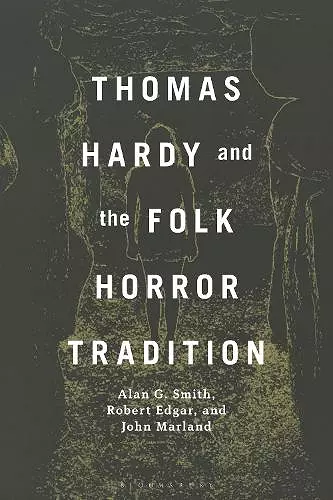Thomas Hardy and the Folk Horror Tradition
Professor or Dr Robert Edgar author Dr John Marland author Dr Alan G Smith author
Format:Hardback
Publisher:Bloomsbury Publishing PLC
Published:1st Jun '23
Currently unavailable, and unfortunately no date known when it will be back

Examines the recent resurgence of folk horror and argues that Thomas Hardy is one of its progenitors by analysing his prose (in particular his rarely examined short fiction) and its adaptations as foundational in the development of folk horror in literature, film and television.
Thomas Hardy and the Folk Horror Tradition takes the uncanny and unsettling fiction of Thomas Hardy as fundamental in examining the lineage of ‘Hardyan Folk Horror’. Hardy’s novels and his short fiction often delve into a world of folklore and what was, for Hardy the recent past. Hardy’s Wessex plays out tensions between the rational and irrational, the pagan and the Christian, the past and the 'enlightened' future. Examining these tensions in Hardy's life and his work provides a foundation for exploring the themes that develop in the latter half of the 20th century and again in the 21st century into a definable genre, folk horror.
This study analyses the subduing function of heritage drama via analysis of adaptations of Hardy's work to this financially lucrative film market. This is a market in which the inclusion of the weird and the eerie does not fit with the construction of a past and its function in creating a nostalgia of a safe and idyllic picture of England’s rural past. However, there are some lesser-known adaptations from the 1970s that sit alongside the unholy trinity of folk horror: the adaptation for television of the Wessex Tales. From a consideration of the epistemological fissure that characterize Hardy’s world, the book draws parallels between then and now and the manifestation of writing on conceptual borders. Through this comparative analysis, Thomas Hardy and the Folk Horror Tradition posits that we currently exist on a moment of fracture, when tradition sits as a seductive threat.
This uniquely individual book melds the traditions of folklore, folk horror, the Gothic and surrealism in order to create an enhanced experience, one focused on interiority, for when we reread the novels, short stories and poetry of Thomas Hardy that we know and love. We are presented with witches and conjurors, skimmity rides and phantom coaches alongside Social Darwinism and eugenics and the 'wierding' of Emma Gifford, Hardy's first wife. Such eclectic elements combine with the philosophy of Schopenhauer and Taylor's notion of the Immanent Frame to remind us of how Hardy re-enchants the universe – reconnecting us with 'an experience that modernity disavows.' From The Wickerman to Hookland, the authors seamlessly posit Hardy as progenitor of modern folk horror and its many visual adaptations, lamenting that with one exception, the 1970s television adaption of certain stories from Wessex Tales, the 'eerie' in Hardy's stories is often turned to the 'dreary', favouring the 'heritage' approach at the cost of the sublime and the supernatural. This book aims to redress that balance, and does so exceedingly well. * Tracy Hayes, Independent Scholar and Secretary, The Thomas Hardy Society, UK *
This book breaks new and important ground. Pointing to a long and deep British history of folk horror, Thomas Hardy and the Folk Horror Tradition delves into folklore, contemporary texts, and Victorian literature. Uncovering a little examined vein of Hardy’s work, this book paves the way for new and exciting explorations of not only Hardy scholarship but also the whole tradition of folk horror. Identifying a ‘Hardyan folk horror’, the authors focus on his ‘dark side’, leading to an enticing and reinvigorating conception of Hardy, his landscapes, beliefs, and the eerie folklore of Wessex. By proving that Hardy’s folk horror was indeed ‘of its age’, the authors open up a whole new world for folk horror scholars, Victorianists, and Hardy specialists. * Ruth Heholt, Associate Professor of Dark Economies and Gothic Literature, Falmouth University, UK *
ISBN: 9781501383991
Dimensions: unknown
Weight: unknown
192 pages